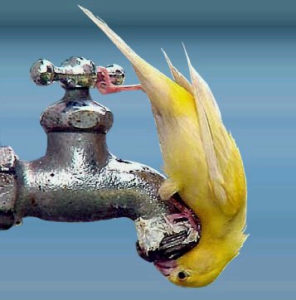
Placement of the feeder should be done with care when it comes to windows. Birds get confused by reflections and accidentally fly into glass. “Window strikes take a huge toll on bird populations,” says John Griffin, the director of urban wildlife at the Humane Society of the United States. To avoid strikes, place feeder within three feet of a window or 30 feet away. “Within three feet they can’t get enough speed to do a lot of damage, and 30 feet is far enough away that they’re unlikely to get confused.
Six things you should never feed local birds:
Bread – Bread has zero nutritional value. If birds fill up on it, they end up not eating what they need. Angel wing is a condition birds get when their bones don’t develop properly because they aren’t getting enough nutrition This often occurs because bread is a staple of their diet. If the case is severe, birds won’t be able to fly.
Sugar – Sugar water ferments. Refill hummingbird feeders every 3 days. Fermented water can kill hummingbirds. Sugar ferments in the sun. If hummingbirds drink too much fermented liquid, it can lead to organ failure and death. Make sure to restock your hummingbird feeder with fresh liquid every three days or go the more natural route by growing plants that attract hummingbirds.
Chocolate – Don’t leave chocolate outside unattended. Chocolate is poisonous for birds and if they eat enough, it can be fatal. So keep your candy stash safely inside.
Rice – Like bread, rice lacks the nutrition that birds need. They’re likely to gorge themselves on it instead of eating nutritious food, resulting in vitamin and mineral deficiencies.
Salt – Don’t salt the water in your birdbath. Extreme care should be used when feeding anything with salt to birds. While salt is a part of birds’ normal diet, it’s easy for them to overdose. A better method to keep your birdbath from freezing is to float a small object in it and check regularly in cold weather.
Milk – If you’re setting out a saucer of milk for a neighborhood kitty, please don’t. Birds are lactose intolerant, and milk can cause severe gastric distress. In large quantities it can kill a bird.
